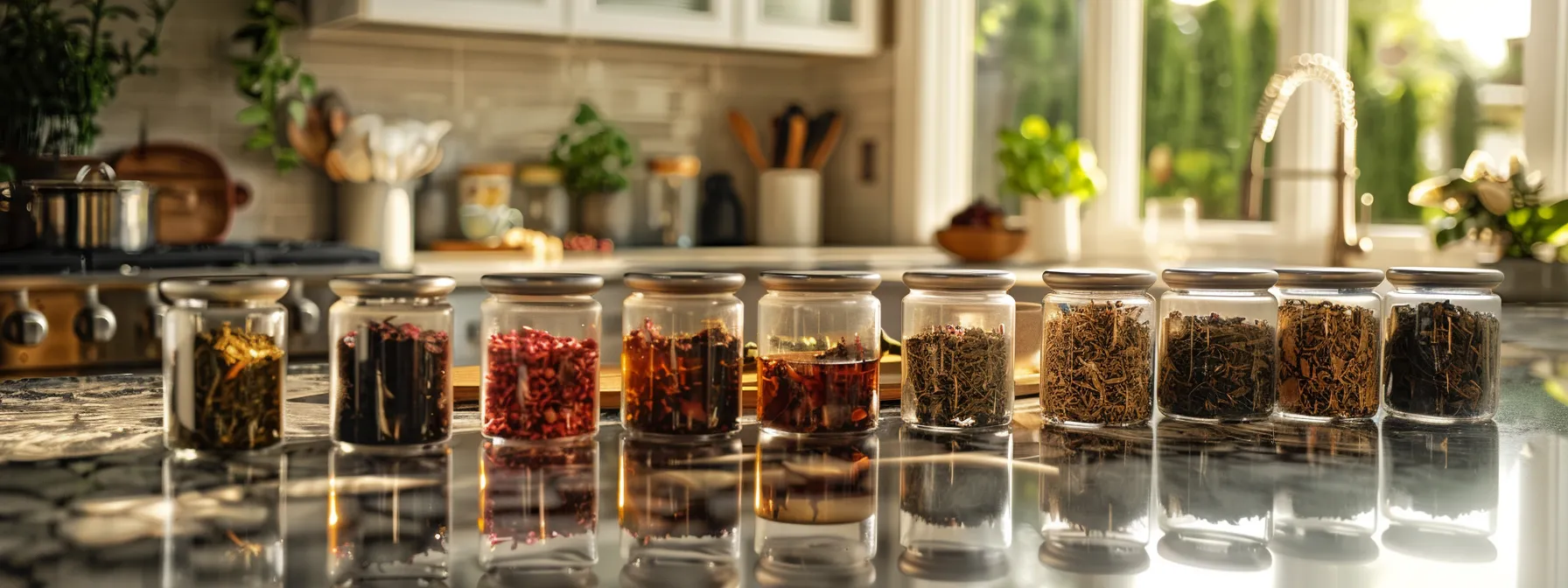Are you seeking a natural way to slim down without relying solely on dietary supplements? Recent studies show that herbal teas can effectively aid in weight loss by supporting metabolism and appetite control. This article will explore how herbal teas help manage metabolic syndrome, highlight the top effective teas for slimming down, and provide tips for incorporating them into your daily routine. By reading this, you will understand how to utilize herbal teas to complement your weight loss goals and address common challenges associated with weight management, all without the caffeine found in many popular beverages.
Key Takeaways
- herbal teas can boost metabolism and support weight loss efforts
- natural appetite suppression from herbal teas helps reduce cravings and overeating
- ingredients like ginger and peppermint improve digestion, aiding weight management
- choosing high-quality herbal teas is essential for effective weight loss
- consulting healthcare professionals ensures safe use of herbal teas in weight loss plans
Understanding How Herbal Teas Aid Weight Loss

Herbal teas can play a significant role in weight loss by influencing several key aspects of metabolism and overall health. The metabolic effects of herbal teas, such as energy expenditure through ingredients like white tea and guarana, contribute to increased fat burning. Additionally, these teas are known for natural appetite suppression, improving digestion, and supplying antioxidants that aid in fat reduction. Specifically, hibiscus tea for weight loss stands out as an effective option. This section will explore these facets in detail, offering practical insights on how herbal teas can be a beneficial addition to weight management efforts.
The Metabolic Effects of Herbal Teas
Herbal teas such as rooibos, known for its rich antioxidant content, can positively influence metabolic processes. Substances like chromium found in various herbal blends may help regulate blood sugar levels, which can lead to reduced cravings and improved weight management. Furthermore, these teas can enhance lipid metabolism, promoting better fat utilization within the body and assisting individuals in their weight loss goals.
- Rooibos tea supports metabolism with antioxidants.
- Chromium helps regulate blood sugar levels.
- Enhancement of lipid metabolism aids fat utilization.
Natural Appetite Suppression Methods
Herbal teas are effective in natural appetite suppression, helping individuals maintain a healthy diet during their weight loss journey. Ingredients found in various slimming herbs tea, such as peppermint and ginger, have been shown to curb cravings and promote a feeling of fullness, thus reducing the likelihood of overeating. By incorporating these teas into daily nutrition, individuals can support their heart rate and overall well-being while managing their weight more effectively.
Enhancing Digestion With Herbal Ingredients
Herbal teas can significantly enhance digestion, making them valuable allies in weight loss efforts. Ingredients like ginger and peppermint act as potent herbal fat burners, stimulating gastric secretions and promoting the efficient breakdown of nutrients. This improved digestion can help minimize the risk of storing excess calories as adipose tissue, ultimately supporting the body’s metabolism and contributing to successful weight management.
The Role of Antioxidants in Fat Reduction
Antioxidants found in herbal teas play a crucial role in fat reduction by reducing oxidative stress in the body. Ingredients such as green tea extract and hibiscus not only act as diuretics but also promote optimal functioning of the gastrointestinal tract, making it easier for the body to process nutrients and eliminate waste. By minimizing oxidative damage, these herbs can help maintain metabolic efficiency, ultimately supporting weight loss goals and enhancing overall health.
Comparing Herbal Teas to Traditional Weight Loss Aids
Herbal teas offer a natural, holistic alternative to traditional weight loss aids, characterized by fewer side effects and inherent health benefits. Unlike many commercial weight loss products that often rely on stimulants and synthetic compounds to suppress appetite or promote fat burning, herbal teas leverage natural ingredients such as gallic acid found in green tea, which may inhibit adipogenesis and improve metabolic efficiency. By promoting healthy gastrointestinal function and reducing calorie intake through appetite control, herbal teas can effectively support weight loss efforts with a more balanced approach.
Herbal teas can be powerful allies in the quest for weight loss. Now, let’s explore the most effective blends that can help slim the waist and sharpen the focus.
Top Effective Herbal Teas for Slimming Down

Top Effective Herbal Teas for Slimming Down
Herbal teas such as green tea and oolong tea offer natural ways to boost metabolism and balance fat metabolism, respectively. Peppermint tea serves as a natural herbal appetite suppressant, helping to reduce cravings. Furthermore, ginger tea enhances digestive efficiency, while hibiscus tea aids in weight management through detoxification. Lastly, rooibos tea helps control stress-induced weight gain, providing a comprehensive approach to effective weight management.
Green Tea: Boosting Metabolism Naturally
Green tea is recognized as a powerful natural tea for weight loss due to its ability to enhance metabolism. It contains catechins, which are natural antioxidants that can help boost energy expenditure, making it an excellent aid for weight management. By incorporating green tea into daily routines, individuals may find that the addition of curcumin and cayenne pepper enhances its effectiveness, further supporting their weight loss efforts through increased fat burning and improved digestive health.
Oolong Tea: Balancing Fat Metabolism
Oolong tea plays a vital role in balancing fat metabolism, making it an effective choice for those aiming to lose weight. It contains epigallocatechin gallate, a compound known for its ability to improve metabolic rates and enhance fat oxidation. When consumed in the right dose, oolong tea can help manage stress-related cravings, offering a support system for individuals during their weight loss journey. Furthermore, combining oolong with calming herbs like chamomile can create a mixture that not only assists in fat loss but also promotes relaxation and overall well-being.
Peppermint Tea: Reducing Cravings
Peppermint tea offers a natural solution for individuals looking to reduce cravings during their weight loss journey. Its aroma has been shown to enhance feelings of fullness, which can help mitigate unnecessary snacking behaviors. Additionally, peppermint‘s ability to support digestion is beneficial for overall metabolic health, helping balance glucose levels and thus supporting efforts to prevent conditions such as type 2 diabetes. Incorporating peppermint tea into a broader sports nutrition regimen can aid in managing hunger, promoting a more effective weight loss strategy.
Ginger Tea: Enhancing Digestive Efficiency
Ginger tea is a remarkable ally for individuals aiming to enhance digestive efficiency and manage weight effectively. Its natural properties can help combat insulin resistance, making it particularly beneficial for those who are overweight or at risk of developing hypoglycemia. For patients seeking natural solutions, incorporating ginger tea into their daily regimen may support healthier digestion and promote a balanced metabolic response, ultimately aiding their weight loss journey.
Hibiscus Tea: Managing Weight Through Detoxification
Hibiscus tea has gained attention for its effectiveness in managing weight through natural detoxification. Rich in antioxidants, a tablespoon of hibiscus tea can help reduce excess carbohydrates in the body, promoting better metabolic function. Additionally, when combined with ginseng, this herbal infusion may enhance its benefits, supporting individuals in their weight loss journey by facilitating healthier digestion and encouraging the elimination of waste products, thereby contributing to overall well-being.
Rooibos Tea: Controlling Stress-Induced Weight Gain
Rooibos tea serves as a natural option for managing stress-induced weight gain. Its compounds may help reduce cortisol levels, which can be crucial since elevated cortisol is associated with increased cravings and weight gain. By incorporating rooibos into a daily routine, individuals can potentially mitigate the irritations of stress that contribute to unhealthy eating habits, while its antioxidant properties further support overall health. Consulting a physician for personalized advice can enhance the effectiveness of using rooibos in a weight management plan, as individual responses to herbal remedies can vary, similar to a placebo effect in other treatments.
Finding the right herbal tea can make all the difference in your weight loss journey. Each type offers unique benefits, and choosing wisely can set you on the path to success.
Selecting the Right Herbal Tea for Your Weight Loss Goals

Selecting the Right Herbal Tea for Your Weight Loss Goals
Choosing the right herbal tea for weight loss involves understanding several key factors. Identifying high-quality tea products ensures effective digestion support, while knowing the difference between organic and non-organic teas can impact health benefits. Reading and interpreting tea labels help in finding extracts and formulations that promote mass loss. Additionally, sourcing teas with proven benefits and avoiding additives and preservatives can enhance overall weight management results.
Identifying High-Quality Tea Products
Identifying high-quality tea products is essential for those seeking to manage hunger and support weight loss effectively. Consumers should look for teas that highlight natural ingredients, such as senna for its detoxifying properties or lemon for its refreshing flavor and digestive benefits. Additionally, choosing teas made from whole leaves rather than powdered forms can enhance flavor and potency, ensuring that beneficial compounds are preserved, ultimately leading to more effective weight management.
Understanding Organic vs. Non-Organic Teas
Understanding the difference between organic and non-organic teas is vital for those looking to enhance their weight loss efforts, particularly as it relates to body mass index and metabolism. Organic teas are cultivated without synthetic pesticides or fertilizers, potentially offering a cleaner option that supports overall health, including kidney function. For individuals seeking meal replacements, selecting organic herbal teas infused with natural ingredients, such as garlic, can provide added benefits by helping to control cravings and improve metabolic rates.
Reading and Interpreting Tea Labels
Reading and interpreting tea labels is vital for choosing effective herbal teas that align with weight loss goals. Consumers should pay attention to the ingredients listed, particularly looking for natural additives instead of artificial sweeteners, which can contribute to unwanted calories and potential abdominal pain. Understanding the nutritional content, including fatty acid profiles, can help individuals select teas that complement their fasting routine and overall lifestyle.
Sourcing Teas With Proven Benefits
Sourcing teas with proven benefits is essential for individuals looking to enhance their weight loss efforts. Pursuing options supported by systematic reviews in clinical nutrition can provide assurance of their effectiveness, particularly regarding body composition changes. Additionally, herbal blends deeply rooted in traditional medicine, such as hibiscus or rooibos, not only offer taste but may also aid in managing conditions like hypotension, thus contributing positively to overall health while supporting weight management goals.
Avoiding Additives and Preservatives
Avoiding additives and preservatives in herbal teas is paramount for individuals focused on effective weight loss. Many commercial tea products contain unnecessary chemicals that can interfere with lipid metabolism and disrupt the body’s natural processes. By selecting teas crafted with pure, natural ingredients, individuals not only support better nutrient absorption but also promote overall health, including improved pressure regulation during physical activity, making their efforts in eating healthily more effective.
Choosing the right herbal tea lays the foundation for weight loss success. Now, learning how to prepare these brews will help unlock their full potential.
Maximizing Benefits: How to Prepare Herbal Teas

To maximize the benefits of herbal teas for weight loss, understanding optimal brewing techniques for nutrient preservation is essential. Selecting ideal serving sizes and consumption frequency can enhance effectiveness, while enhancing flavor without added calories ensures a satisfying experience. Combining different teas safely and timing tea intake for best results further supports digestive health and improves the efficacy of polyphenols in promoting weight management.
Optimal Brewing Techniques for Nutrient Preservation
To maximize the benefits of herbal teas for weight loss, proper brewing techniques are essential to preserve the vital nutrients and active compounds. For instance, oolong tea requires a lower temperature than boiling water to maintain its essential oils and enhance its metabolism-boosting effects. Additionally, dandelion tea, known for its role in weight loss, should steep for at least 5 to 7 minutes to extract beneficial components that can assist in combating obesity while promoting digestion and detoxification:
Implementing these techniques will not only safeguard the herbal teas’ properties but also enhance their effectiveness in supporting weight management goals.
Ideal Serving Sizes and Consumption Frequency
For optimal effectiveness, maintaining appropriate serving sizes and consumption frequency of herbal teas plays a crucial role in supporting weight loss efforts. Research indicates that enjoying one to three cups of natural slimming tea daily can help balance hunger hormones such as ghrelin, aiding in appetite control. Additionally, integrating antioxidant-rich teas like green or hibiscus can provide health benefits, including potential support for managing hypertension, while maximizing the overall impact on weight reduction.
Enhancing Flavor Without Added Calories
Herbal slimming tea offers an array of flavors without the need for added calories. For those looking to enhance the taste of their ginger tea, incorporating fresh herbs like mint or a splash of lemon can provide a refreshing twist. Research indicates that adding natural flavorings not only improves the sensory experience but can also augment the health benefits associated with catechins found in various teas, making the weight loss journey more enjoyable and sustainable.
Combining Different Teas Safely
Combining different herbal teas can enhance their overall effectiveness for weight loss by leveraging unique properties from various plants. Careful selection of complementary ingredients, such as mixing Camellia sinensis (green tea) with fenugreek, can create a powerful detox blend that not only aids digestion but also boosts energy levels. Incorporating these teas into a daily routine can provide a holistic approach to weight management, supporting organ health and reinforcing the body’s natural metabolic processes.
- Select teas with complementary properties for better results.
- Mixing green tea with fenugreek enhances detox benefits.
- Combining various teas promotes energy and organ health.
Timing Your Tea Intake for Best Results
Timing tea intake strategically can enhance the effectiveness of herbal teas in promoting weight loss and supporting processes like lipolysis, the breakdown of fats in the body. For instance, consuming green tea after meals may help in better digestion and nutrient absorption, while spacing out tea consumption to avoid potential issues like arrhythmia from excessive caffeine is essential for maintaining heart health. This careful approach not only optimizes the health benefits derived from key ingredients but also improves overall metabolic function, making it an integral part of a weight management plan.
Preparing herbal teas opens the door to a world of flavor and health. Now, it is time to consider how these teas fit into a healthy lifestyle.
Incorporating Herbal Teas Into a Healthy Lifestyle

Incorporating herbal teas into a healthy lifestyle offers a holistic approach to weight loss centered on detoxification and balanced nutrition. Pairing teas with nutritious meals enhances the benefits of flavonoids, promoting overall health. Developing a daily tea routine, integrating complementary exercises, and setting achievable weight loss targets can create an effective plan. Monitoring progress and adjusting habits will further support individuals on their weight loss journey.
Pairing Teas With Balanced Nutrition
Pairing herbal teas, such as hibiscus tea, with balanced nutrition can significantly enhance weight loss efforts by addressing common issues like bloating and hyperlipidemia. The potassium content in hibiscus tea may help regulate fluid balance, reducing bloating, while its rich antioxidants support overall metabolic health. Additionally, incorporating foods rich in conjugated linoleic acid, like lean meats and dairy, can further complement the effects of herbal teas, promoting effective fat utilization and overall well-being in a weight management plan.
Developing a Daily Tea Routine
Developing a daily tea routine can significantly support individuals aiming to lose weight fast by strategically timing teas to curb appetite and promote digestive health. For instance, starting the day with green tea can enhance metabolism, while enjoying ginger tea after meals may aid in soothing the stomach and enhancing nutrient absorption. Consistency is key; setting specific times for tea consumption helps make it a regular part of a healthy lifestyle that encourages effective weight management:
- Start the day with metabolism-boosting tea, like green tea.
- Incorporate a digestive tea, such as ginger, after meals.
- Maintain a regular schedule for tea intake to support appetite control.
Complementary Exercises for Weight Loss
Incorporating complementary exercises into a weight loss regimen can significantly enhance the effects of herbal teas and promote overall well-being. Activities such as brisk walking, yoga, or strength training can elevate metabolism and support the body in utilizing the antioxidants found in herbal teas more efficiently. Individuals should aim for a balanced routine that engages different muscle groups and encourages calorie burning, fostering a harmonious approach to weight management.
- Prioritize activities that elevate heart rate.
- Include strength training to build muscle and boost metabolism.
- Incorporate flexibility exercises like yoga for relaxation and recovery.
Setting Achievable Weight Loss Targets
Setting achievable weight loss targets is essential for anyone looking to incorporate herbal teas into a healthy lifestyle. Individuals should aim for realistic goals, such as losing one to two pounds per week, which can be facilitated by integrating metabolism-boosting herbal teas like green and oolong tea into a balanced diet. By establishing these manageable objectives, people can experience steady progress while leveraging the appetite-suppressing properties of herbal teas to support their weight loss journey effectively.
Monitoring Progress and Adjusting Habits
Monitoring progress and adjusting habits is crucial for individuals incorporating herbal teas into their weight loss journey. By tracking daily tea consumption alongside meals and overall dietary habits, individuals can identify patterns that affect their weight management. For instance, noticing how herbal teas impact appetite and metabolism allows for timely modifications, ensuring that the chosen blends effectively support weight loss goals while enhancing overall well-being.
Herbal teas hold promise for health, but caution is wise. Understanding their effects can help in making informed choices for a balanced life.
Precautions and Understanding Potential Side Effects

Recognizing allergic reactions is essential when incorporating herbal teas into a weight loss regimen, as some individuals may be sensitive to specific ingredients. Additionally, it is important to understand potential interactions with medications and consider caffeine sensitivity, which can affect overall health. Consulting healthcare professionals and following guidelines for safe consumption can ensure that herbal teas contribute positively to weight loss efforts without adverse effects.
Recognizing Allergic Reactions
Recognizing allergic reactions is vital for anyone considering herbal teas for weight loss. Some ingredients may trigger sensitivities in certain individuals, leading to symptoms such as hives, gastrointestinal distress, or respiratory issues. It is essential for consumers to read ingredient labels carefully, especially if they have a history of allergies, to ensure the safe incorporation of herbal teas into their weight management regimen:
Interactions With Medications
When incorporating herbal teas into a weight loss regimen, individuals should be mindful of potential interactions with medications. Certain herbal ingredients can affect how medications are metabolized, leading to unintended side effects or reduced effectiveness. For example, hibiscus tea may lower blood pressure and could interact with antihypertensive drugs, necessitating caution for those on such treatments. Consulting a healthcare professional is essential to ensure that the chosen herbal teas complement existing medications safely, enhancing the overall weight management approach without compromising health.
Caffeine Sensitivity Considerations
Caffeine sensitivity can significantly impact individuals when incorporating herbal teas into a weight loss regimen. For those sensitive to caffeine, consuming certain herbal teas such as green or oolong tea, which contain moderate caffeine levels, may lead to increased heart rates, anxiety, or insomnia. It is essential for individuals to monitor their body’s responses to these teas and consider caffeine-free alternatives, like rooibos or herbal infusions, that can still support weight management without the adverse effects of caffeine sensitivity.
Consulting Healthcare Professionals
Consulting healthcare professionals is a recommended step for individuals considering the integration of herbal teas into their weight loss plan. These experts can provide personalized advice regarding potential interactions with medications and any health conditions that may be affected by herbal ingredients. By collaborating with healthcare providers, individuals can ensure that their approach to using herbal teas for weight management is safe and effective, taking into account their unique health profiles and dietary needs.
Guidelines for Safe Consumption
To ensure safe consumption of herbal teas for weight loss, individuals should follow specific guidelines. It is advisable to start with small amounts to assess tolerance and gradually increase intake based on personal comfort. Additionally, consultation with healthcare professionals is recommended, particularly for those who are pregnant, nursing, or taking medications that may interact with herbal ingredients.
Conclusion
Effective herbal teas serve as a natural and valuable tool for weight loss, promoting enhanced metabolism, appetite control, and improved digestion. By incorporating teas like green, hibiscus, and ginger into daily routines, individuals can leverage their unique properties to support sustainable weight management. Understanding the importance of high-quality ingredients and proper preparation can maximize the benefits of these herbal infusions. Embracing herbal teas not only aids in slimming down but also fosters a healthier lifestyle, showcasing their relevance and value in modern wellness practices.
